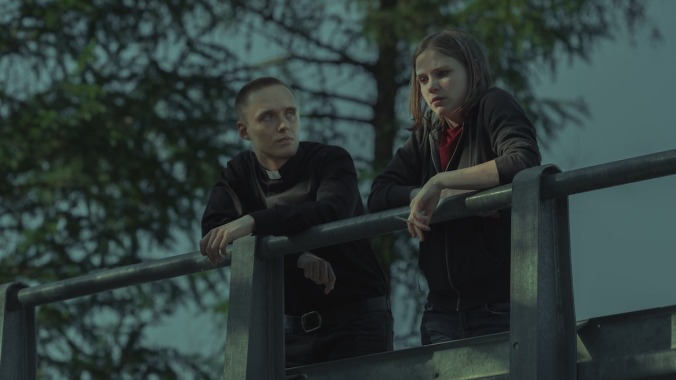A holy man fakes it until he makes it in the moving, Oscar-nominated Corpus Christi

Characters who impersonate religious figures tend to be a source of comedy—think of Whoopi Goldberg posing as a nun in Sister Act, or Robert De Niro and Sean Penn mugging up a storm as fake priests in We’re No Angels. There’s nothing amusing at all, however, about Corpus Christi, Poland’s submission to this year’s competition for the Oscars’ newly renamed Best International Feature Film. (It was nominated, but got mowed down by the unprecedented foreign language juggernaut that was Parasite.) Loosely based on actual events, this intense, sometimes nearly operatic drama begins and ends with brutal acts of violence, which bookend an examination of how one damaged soul can be uniquely qualified to help others. Some of its moves are as familiar (and as easy to tune out) as a liturgy; others flirt with the divinely mysterious.
First seen keeping watch while some of his fellow juvenile-hall inmates commit an assault, Daniel (Bartosz Bielenia) doesn’t exactly come across as holier than thou, even if he sings at the facility’s mass and seems bummed to learn that his criminal record will disqualify him from enrolling in a seminary. After being released, he heads to a neighboring town, where the state has secured him a menial job at a sawmill. But Daniel can’t bear the thought of kicking off his new dead-end existence, and instead takes a pew at the local church, where he tells a young woman (Eliza Rycembel) that he’s a priest, showing her the cassock and collar he’d swiped from the reformatory. This impulsive lie, intended strictly for the moment, leads to his swiftly being commandeered into filling in for the village’s actual priest, who heads for a stint in rehab.
Again, this scenario is ostensibly based on a true story, or several of them. (Director Jan Komasa claims that it’s a fairly common occurrence in Poland of late.) But the most obvious dramatic choice would be for Daniel to gradually take on the characteristics of the role he’s playing, and that’s exactly what happens. The village is still reeling from a two-car accident that killed six teenagers, with people heaping abuse on the widow of the man (also killed) who’d been driving the other vehicle; Daniel takes it upon himself to heal this festering wound, even though the attempt alienates much of his congregation. His emotional journey may be predictable (and needless emphasis gets placed on whether or not the widow’s dead husband was in fact at fault, which shouldn’t make any difference), but there’s plentiful startling detail en route. That’s likewise true of the threat of discovery, which involves a vengeful reform-school bully who’s planted in the first act like Chekhov’s gun but doesn’t go off in the final act quite as one might anticipate.
Corpus Christi’s most combustible element by far is its lead performance. Bielenia has piercing blue eyes similar to Elijah Wood’s, but they’re set deep in a long, gaunt face that seems perpetually on the verge of rejecting them. He’s scary-looking even in repose. That Daniel in no way conforms to our mental image of a priest makes his spiritual metamorphosis all the more powerful, and Bielenia expertly modulates his demeanor to suggest multiple facets of a single person, without ever suggesting that Daniel deliberately adopts a false persona (apart from the collar). This is still a movie that can be hackneyed enough to cut directly from someone encouraging Daniel’s sobriety (“You’re gonna make it,” with a hearty shoulder clap) to Daniel snorting a line of coke, and it certainly didn’t merit an Oscar nomination in a year that offered such riches as It Must Be Heaven (from Palestine) and A White, White Day (from Iceland). But it deviates enough from formula—especially in its arresting ending, which takes full advantage of Bielenia’s haunted visage—to be worth seeing.